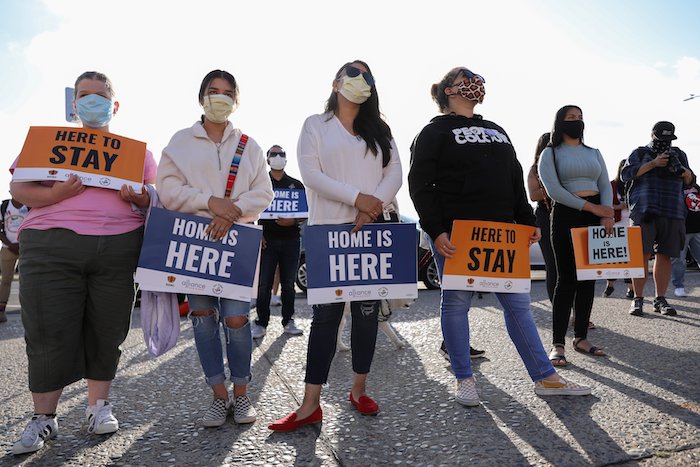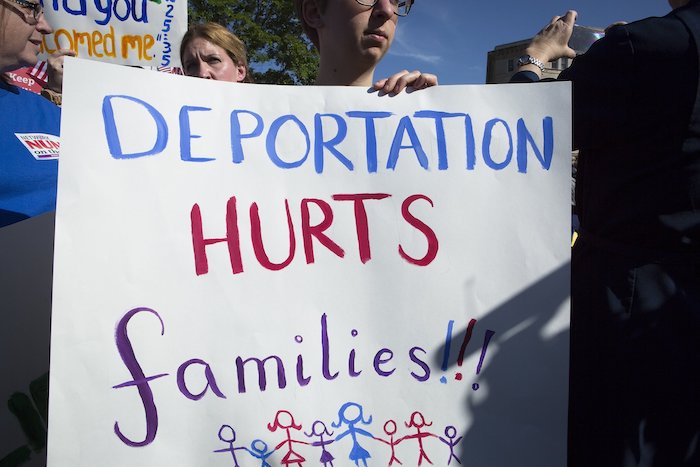NEW YORK — Cirenio Cervantes, who arrived in the United States at the age of 7 with his parents from Mexico, became a Deferred Action Childhood Arrival (DACA) recipient in 2012, but he still remembers when his family would travel state to state looking for the next vegetable to pick.
It was Cervantes’ church that hosted the DACA clinic that ultimately enabled him and his brother to apply for the program — a pathway for young undocumented immigrants to get temporary protected status in the U.S. Nine years later, he now leads DACA clinics in Florida as a congregation organizer with the organization Faith in Florida to help other undocumented immigrants access the program the way his church community once did for him.

“This just goes to show the importance of implementation,” Cervantes said of his journey to becoming a DACA recipient. “The importance of having trusted individuals where you can go to be safely and adequately applied for a status that can help you live a better life in this country.”
Cervantes told his story at a press conference Tuesday for the launch of the “Ready to Stay” campaign. The campaign, launched by a coalition comprised of 18 national immigration advocacy organizations that cover all 50 states, is a nationwide effort to help undocumented immigrants navigate and access available legal services.
These include DACA, Temporary Protected Status (TPS) for undocumented immigrants from certain countries, and the Liberian Refugee Immigration Fairness (LRIF) program.
Angelica Salas, the executive director of the Coalition for Humane Immigration Rights (CHIRLA) and Ready to Stay co-chair, called the campaign an “effort to be ready and build the community education and legal services infrastructure needed to deliver on any mass scale legalization effort.”
Bishop Jaime Soto of Sacramento, Catholic Legal Immigration Network, Inc. (CLINC) Board of Directors chairman, called it an opportunity to create a robust nationwide network to walk with and work with immigrant refugees in whatever remedies are available.
“We are hopeful that under the current administration we will make some progress, hopefully significant progress, in immigration reform, but whatever we’re able to achieve through the Congress there should be no doubt about our commitment to walk with the immigrant and refugee community,” Bishop Soto said.
“Our hope is that with this initiative of Ready to Stay that we can not only develop good service providers but more at the heart is to develop good neighbors that will provide a welcoming and hospitality to our brothers and sisters who have come here seeking to be a part of American society,” he continued.
With CHIRLA and CLINIC, immigration advocacy organizations involved in the campaign include Faith in Action, which Faith in Florida is under, and the Center for Migration Studies.
At the press conference, Daniela Alulema, the director of programs at the Center for Migration Studies, cited a number of data points compiled by the organization on the undocumented population in the United States.
The latest estimates from the organization indicate that roughly 10.3 million undocumented immigrants live in the U.S. The Top 10 countries this population comes from include Mexico, El Salvador, India, China, the Philippines, and Brazil.
The data further shows that 58 percent of the undocumented population have lived in the U.S. for more than 10 years, roughly 1 million immigrants are eligible for the existing DACA program, and approximately half a million undocumented immigrants are eligible for the Temporary Protected Status program with the largest groups coming from El Salvador, Venezuela, and Haiti.
There are then approximately 10,000 immigrants who are potentially eligible for the Liberian Refugee International Fairness Program, the data shows.

Alulema, who is a DACA recipient herself, said that these statistics “highlight the importance of having a coordinated effort to ensure that every immigrant who is eligible for these programs can access trusted and affordable legal services in their communities.”
In addition to helping undocumented immigrants with the programs that exist, a focus of the campaign is preparing and advocating for large-scale legalization implementation that could come down the line.
President Joe Biden has stated his commitment to immigration reform, and advocates are hopeful that the nation’s second Catholic commander-in-chief will work to move forward his plan announced earlier this year to provide the nation’s undocumented population a pathway to citizenship.
“The time is now to pass a new, bold, generous path to citizenship for millions,” Salas said. “For the Ready to Stay coalition now is also the time to begin to put down the building blocks that will ensure the long-awaited relief and permanent status.”
Cervantes spoke about the need comprehensive for immigration reform, citing the fact that although he has DACA protections, his parents are still under the threat of deportation.
“We must push for legislation that protects the people that call this country their home,” he said. “And most importantly, we need a system of implementation that will allow people to apply.”
To get the campaign off the ground the coalition of organizations launched a website, readytostay.org. The website features two main resources. One for immigrants themselves to access information and search for legal help in their area. The other is a resource for advocates to inform themselves on TPS, DACA fraud prevention, community education materials, proposed bills, and immigration reform.
Out of the gate, fraud prevention is one focus of the campaign, which Bishop Soto said can best be done through creating a broad network nationwide.
“What makes people vulnerable of falling into those who will exploit them or take advantage of them is when they feel alone or they feel isolated,” Bishop Soto said. “So, the stronger our network is the more the people will know where to go to get good information.”
